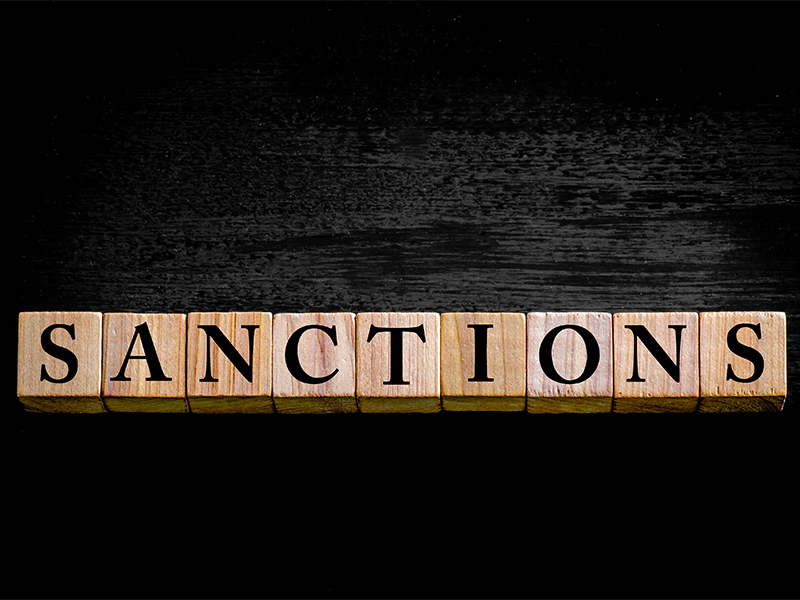EU sanctions

Related topics
Sanctionsdate: 17/06/2022
The EU has so far adopted six packages of sanctions against Russia and Belarus because of their unprovoked attack against Ukraine - the most recent one on 3 June. They target the Russian financial, energy and transport sectors, impose asset freezes on certain individuals, ban certain transactions related to the Central Bank of Russia, decouple key Russian banks from SWIFT, full asset freezes on 4 Russian banks, closed the EU airspace to Russian aircrafts, banned Russian media outlets in the EU and prohibited the export of maritime navigation goods and technology for use in Russia or on Russian vessels.
Impact on Russia
EU financial measures have had a profound effect on Russia’s economy and financial markets, although the Central Bank of Russia (CBR) and other Russian authorities have managed to temporarily soften the impact. The recent strengthening of the ruble is fundamentally unsustainable. The ruble is no longer a convertible currency, so its exchange rate is an artificial indicator that tells little about the economy. Its apparent stabilization is deceptive and does not reflect the enormous shock that the real economy is experiencing due to sanctions. The exchange rate will inevitably at some point start reflecting the true position of the Russian economy.
Many other indicators show that EU sanctions are having a very strong impact. The rising cost of living, for example - Russian consumer prices were up 16.7% in March year-on-year. The current policy interest rate by the CBR is incompatible with economic growth, and a double-digit recession is widely anticipated in 2022. The Central Bank of Russia expects a significant drop in the current account surplus, meaning that, going forward, there will be fewer stabilisation instruments available for Russia.
In the medium to long term, countermeasures that Russian authorities have undertaken will not be able to cushion the impact of the sanctions. The Russian economy will shrink substantially. We need to allow some time for sanctions to fully work through the Russian economy and finance.
Impact on the EU
The impact of sanctions on the EU economy is difficult to quantify at this stage, but it is clear that it will be significant. It is materialising via a number of channels including confidence and commodity prices.
Business and consumer surveys show that consumer confidence has fallen sharply after the start of Russia’s war and that confidence in the business sector has also fallen in the EU. The shock hit the economy at a moment when fundamentals looked strong and the easing of pandemic measures was brightening the economic outlook.
Our financial markets have reacted to these events. Share prices have been falling and volatility has risen, due to the general uncertainty and indirect effects of the war. Bond yields have gone up, but spreads remain rather contained, implying limited fragmentation; meanwhile, share prices have recovered from the initial shock.
So far, the markets’ functioning remained intact. We have not experienced severe strains in money or security markets or liquidity shortages in the banking system.
Going forward
Looking further ahead, there are nevertheless some potential risks and indirect effects that could affect the EU financial system and could therefore become more of a concern. Foremost, there is the prospect of slower economic growth in the EU and higher inflationary pressures, coupled with the loss of business and consumer confidence and increased risk aversion. This could create a difficult environment for the financial sector. A weakening economic outlook would be negative for bank earnings and asset quality, putting pressure on bank profitability.
Higher risk aversion in the banking sector could result in reduced lending to the real economy. Such second-round effects may be particularly sizeable for Member States that have significant economic or financial links with Russia or are most exposed to price increases in energy or non-energy commodities.
We should not forget that our financial institutions have become much more resilient in the last decade, not least due to the strong regulatory and supervisory framework developed and implemented within the EU. Bank balance sheets remain healthy overall, owing to robust capital positions and fewer non-performing loans. Altogether, this should enable the financial sector to weather this storm well.
The EU’s sanctions on Russia and Belarus are designed to make it harder, financially, for them to pursue their attack on Ukraine. Even the limited period from the beginning of imposition of sanctions shows that they are indeed working. It is also important to note that patience is required to see them work best.
